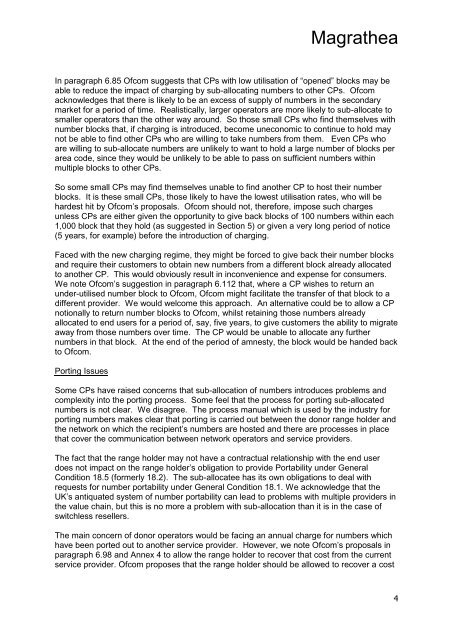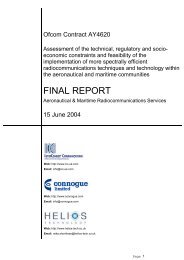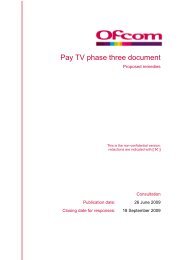Magrathea - Stakeholders - Ofcom
Magrathea - Stakeholders - Ofcom
Magrathea - Stakeholders - Ofcom
You also want an ePaper? Increase the reach of your titles
YUMPU automatically turns print PDFs into web optimized ePapers that Google loves.
<strong>Magrathea</strong><br />
In paragraph 6.85 <strong>Ofcom</strong> suggests that CPs with low utilisation of “opened” blocks may be<br />
able to reduce the impact of charging by sub-allocating numbers to other CPs. <strong>Ofcom</strong><br />
acknowledges that there is likely to be an excess of supply of numbers in the secondary<br />
market for a period of time. Realistically, larger operators are more likely to sub-allocate to<br />
smaller operators than the other way around. So those small CPs who find themselves with<br />
number blocks that, if charging is introduced, become uneconomic to continue to hold may<br />
not be able to find other CPs who are willing to take numbers from them. Even CPs who<br />
are willing to sub-allocate numbers are unlikely to want to hold a large number of blocks per<br />
area code, since they would be unlikely to be able to pass on sufficient numbers within<br />
multiple blocks to other CPs.<br />
So some small CPs may find themselves unable to find another CP to host their number<br />
blocks. It is these small CPs, those likely to have the lowest utilisation rates, who will be<br />
hardest hit by <strong>Ofcom</strong>’s proposals. <strong>Ofcom</strong> should not, therefore, impose such charges<br />
unless CPs are either given the opportunity to give back blocks of 100 numbers within each<br />
1,000 block that they hold (as suggested in Section 5) or given a very long period of notice<br />
(5 years, for example) before the introduction of charging.<br />
Faced with the new charging regime, they might be forced to give back their number blocks<br />
and require their customers to obtain new numbers from a different block already allocated<br />
to another CP. This would obviously result in inconvenience and expense for consumers.<br />
We note <strong>Ofcom</strong>’s suggestion in paragraph 6.112 that, where a CP wishes to return an<br />
under-utilised number block to <strong>Ofcom</strong>, <strong>Ofcom</strong> might facilitate the transfer of that block to a<br />
different provider. We would welcome this approach. An alternative could be to allow a CP<br />
notionally to return number blocks to <strong>Ofcom</strong>, whilst retaining those numbers already<br />
allocated to end users for a period of, say, five years, to give customers the ability to migrate<br />
away from those numbers over time. The CP would be unable to allocate any further<br />
numbers in that block. At the end of the period of amnesty, the block would be handed back<br />
to <strong>Ofcom</strong>.<br />
Porting Issues<br />
Some CPs have raised concerns that sub-allocation of numbers introduces problems and<br />
complexity into the porting process. Some feel that the process for porting sub-allocated<br />
numbers is not clear. We disagree. The process manual which is used by the industry for<br />
porting numbers makes clear that porting is carried out between the donor range holder and<br />
the network on which the recipient’s numbers are hosted and there are processes in place<br />
that cover the communication between network operators and service providers.<br />
The fact that the range holder may not have a contractual relationship with the end user<br />
does not impact on the range holder’s obligation to provide Portability under General<br />
Condition 18.5 (formerly 18.2). The sub-allocatee has its own obligations to deal with<br />
requests for number portability under General Condition 18.1. We acknowledge that the<br />
UK’s antiquated system of number portability can lead to problems with multiple providers in<br />
the value chain, but this is no more a problem with sub-allocation than it is in the case of<br />
switchless resellers.<br />
The main concern of donor operators would be facing an annual charge for numbers which<br />
have been ported out to another service provider. However, we note <strong>Ofcom</strong>’s proposals in<br />
paragraph 6.98 and Annex 4 to allow the range holder to recover that cost from the current<br />
service provider. <strong>Ofcom</strong> proposes that the range holder should be allowed to recover a cost<br />
4
















